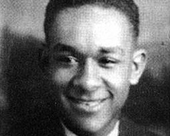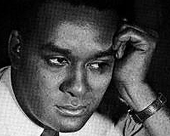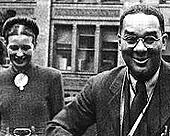
Richard Wright was born outside Natchez, Mississippi, on September 4, 1908, the
son of an illiterate sharecropper. As a boy growing up in the segregated Deep
South, Wright was abandoned by his father and forced to live in poverty. From
a very early age, he found an escape from the hunger and violence of his everyday
life in the written word. A voracious reader, Wright was a star student, graduating
as valedictorian of Smith Robertson Junior High School in Jackson, Mississippi.
It was during this time that Wright published "The Voodoo of Hell's Half Acre",
his first short story. Reading expanded his intellect and made him aware of
the injustices he experienced as a black boy living in the South. African-Americans
at the time were migrating in huge numbers to Chicago with the promise of economic
opportunity and a fairer society, and Wright joined the flow as soon as he saved
enough money to make the trip. During the Depression, Wright joined the Communist
Party, and became active in the progressive literary movement which was sweeping
Chicago and the nation. As a member of the Federal Writers' Project, he wrote
proletarian poetry, stories and articles for the Daily Worker while studying
at the Chicago John Reed Club. Wright honed his skills until he felt confident
enough to travel to New York, the literary capital, where he dedicated himself
to his art. While in New York, Wright's talents became widely recognized,
and within a few years he was winning awards for his stories, and receiving excellent
reviews from his critics. Wright withdrew from the Communist Party as he started
to achieve popularity. He did not accept their attempt to use him as a voice for
their leftist agenda. Instead, Wright felt he had his own unique narratives to
express. In 1940, Native Son was published and became an instant bestseller.
In the words of critic Irving Howe, "The day Native Son appeared American
culture was changed forever." An adaptation for the Broadway stage was produced
by Orson Welles and John Houseman, and in 1951 a feature film of the novel was
screened internationally. During the war years, Wright lived in New York where
he lectured and began work on his autobiography, Black Boy. Published in
1945, Black Boy : A Record of Childhood and Youth also became a best seller,
and was accompanied by a major photo spread in Life magazine. After the success
of Black Boy, Wright felt "burnt out" with the New York scene, and decided
to travel to London and Paris, where he was a guest of the French government.
He found the intellectual and cultural climate in France amenable and within a
year decided to expatriate his family to Paris. Living in the Quartier Latin,
Wright was charmed by "the prevalence of literacy, the beautiful statues, the
bookstores at every corner" and remarked that he had "not detected the least iota
of racial tension against the Negroes." He contrasted the respect he was afforded
by the French people with the situation in America, which was "not bad, but hopeless.
The Negro eats, he has a roof over his head, he has a good time, but, beyond that,
he is shut off. There is a ceiling on any aspiration whether it be in the field
of education, jobs, or anything else." Instantly, Wright was immersed in the
intellectual cafe milieu of Paris. He befriended the French writers and philosophers
of his day, such as Andre Gide, Jean-Paul Sartre and Simone de Beauvoir and found
himself at the center of an expatriate community of African-American writers which
included Chester Himes and James Baldwin. It was at this time that life in the
demimonde afforded him the opportunity to come in contact with the West
Indian poet Aime Césaire and the Senegalese intellectual Léopold
Sédar Senghor. Together they founded the Negritude movement, which sought
to re-appropriate the cultural agency of black Africans living under European
colonial domination. Wright became absorbed in the revolutionary writings of Franz
Fanon, as well as the phenomenological, existential thought of Husserl and Heidegger,
and he began to view the problems of black people from a global perspective, likening
the plight of African-Americans with that of the oppressed majority of the world's
peoples. Wright continued a very productive artistic and political life in
Paris. He saw the completion of the movie adaptation of Native Son, wrote
fiction which was influenced by the existentialist crisis with which he was engaged,
contributed many essays on the status of race relations, and participated in international
conferences on the third world. A bout of amebic dysentery brought about persistent
health problems over the following months and in 1960, his life was cut short
by a heart attack. Richard Wright was cremated along with a copy of Black Boy
in the Pere Lachaise cemetery in Paris.
| 
| 
| 
| 
|
G
A L L E R Y | | 
Richard
Wright at his High School Graduation. [enlarge]

Wright
after completing Native Son. [Enlarge]

Wright
with good friend Simone de Beauvoir, Parisian intellectual. [Enlarge]
| | |